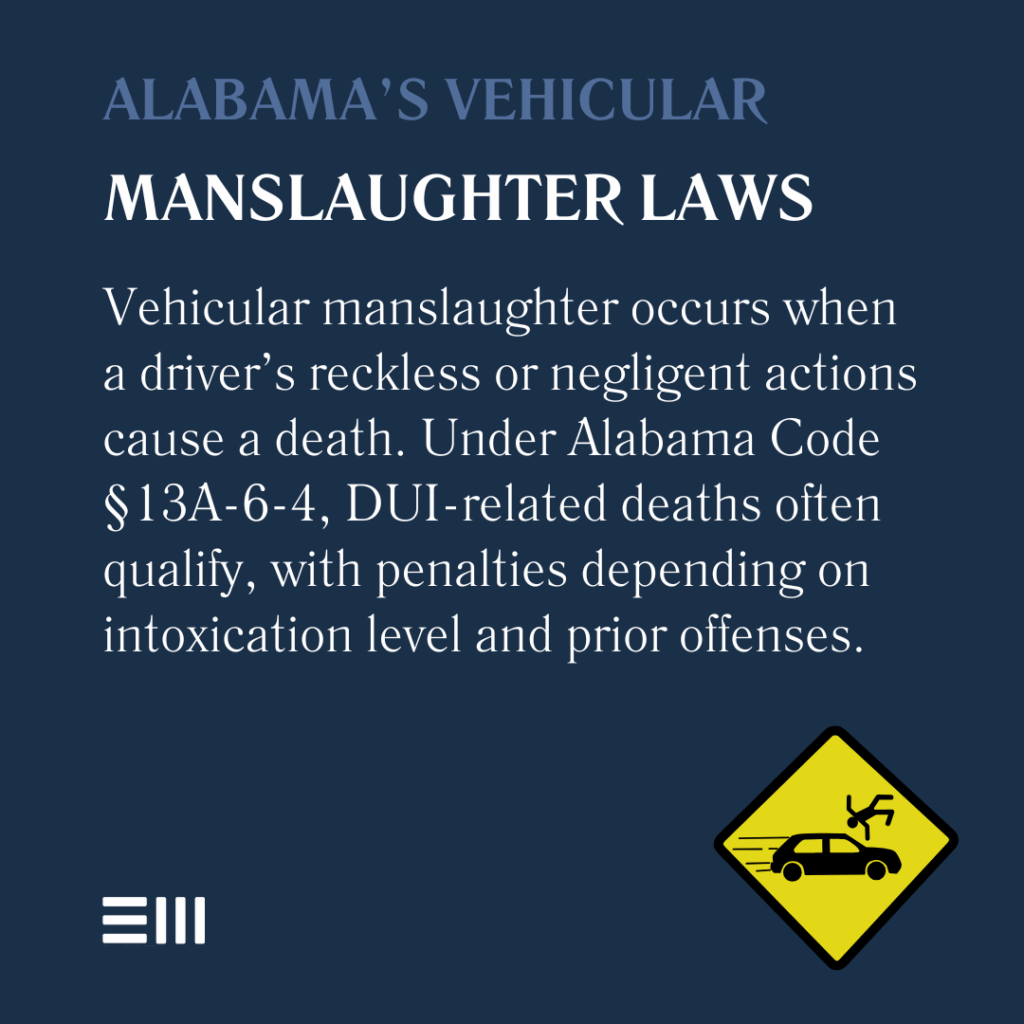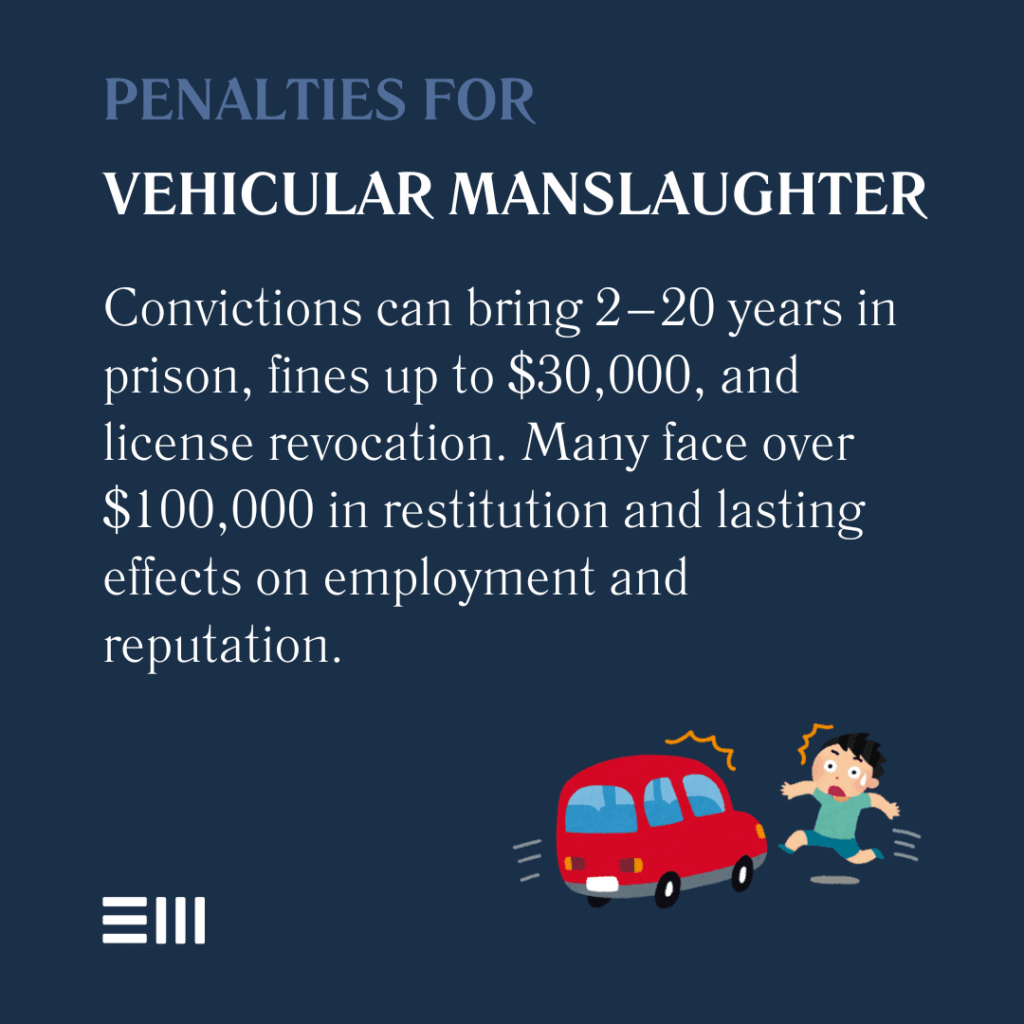
Every 15 minutes, someone dies in an alcohol-related traffic incident in the United States, transforming ordinary drivers into defendants facing life-altering criminal charges.
When a vehicle becomes the instrument of another person’s death, the legal system must balance tragedy with justice, accident with accountability.
Vehicular manslaughter charges in Alabama carry consequences that extend far beyond typical traffic violations, potentially resulting in decades of imprisonment and permanent loss of driving privileges.
For those already facing DUI charges, the addition of vehicular manslaughter dramatically increases the severity of potential penalties.
Understanding Alabama’s Vehicular Manslaughter Laws
Alabama law distinguishes vehicular manslaughter from other forms of homicide based on the specific circumstances surrounding a fatal traffic incident.
The prosecution must prove that a driver’s actions directly caused another person’s death through criminal negligence or recklessness while operating a motor vehicle.
Under Alabama Code § 13A-6-4, vehicular homicide occurs when someone causes the death of another person while driving under the influence of alcohol or controlled substances.
The state recognizes different degrees of vehicular manslaughter based on factors including intoxication level, prior offenses, and the presence of aggravating circumstances.
First-degree vehicular homicide applies when death results from DUI combined with additional reckless behavior, while second-degree charges involve fatal accidents during simple DUI without aggravating factors.
The distinction between vehicular manslaughter and murder charges often depends on intent and circumstances. While murder requires malice aforethought, vehicular manslaughter typically involves unintentional death resulting from negligent or reckless driving behaviors.

Criminal Penalties and Sentencing Guidelines
The severity of vehicular manslaughter penalties in Alabama reflects the serious nature of taking another person’s life through dangerous driving behaviors.
Sentencing varies significantly based on the specific charges and circumstances of each case.
- Class B felony vehicular homicide carries 2 to 20 years in state prison.
- Mandatory minimum sentences apply for repeat DUI offenders causing death.
- Fines can reach $30,000 for first-degree vehicular homicide convictions.
- Driver’s license revocation lasts minimum one year, often permanently.
- Probation terms typically include substance abuse treatment and community service.
- Restitution payments to victims’ families often exceed $100,000.
These criminal penalties represent only part of the consequences facing those convicted of vehicular manslaughter.
Additional collateral consequences include difficulty finding employment, loss of professional licenses, and permanent criminal records that affect housing and educational opportunities.

Common Defenses Against Vehicular Manslaughter Charges
Defending against vehicular manslaughter charges requires a thorough investigation of the incident and strategic challenges to the prosecution’s evidence. Effective defense strategies focus on disproving essential elements of the charge or presenting mitigating circumstances.
Challenging causation remains a primary defense strategy, particularly when multiple factors contributed to the fatal accident.
Defense attorneys may argue that road conditions, weather, mechanical failures, or the victim’s own actions played significant roles in causing the death.
Expert accident reconstruction testimony often proves crucial in establishing alternative explanations for the fatal collision.
Constitutional challenges to evidence collection procedures can result in the suppression of key prosecution evidence.
Improper traffic stops, flawed field sobriety tests, or violations of Miranda rights may compromise the state’s case. Additionally, medical conditions or prescription medications can sometimes explain behaviors that officers mistakenly attribute to impairment.
The Role of Blood Alcohol Content and Drug Testing
Blood alcohol content (BAC) testing and drug screening play central roles in vehicular manslaughter prosecutions involving suspected impairment.
Alabama’s per se DUI limit of 0.08% BAC establishes a presumption of impairment, though prosecutors can pursue charges with lower levels when combined with other evidence.
Testing procedures must follow strict protocols to ensure admissibility in court. Chain of custody requirements, proper equipment calibration, and qualified personnel conducting tests all factor into the reliability of results.
Defense attorneys scrutinize every aspect of testing procedures, from the initial traffic stop through laboratory analysis. Delays in testing, improper storage of samples, or equipment malfunctions can cast doubt on test results.
The presence of prescription medications or medical marijuana complicates impairment determinations.
Unlike alcohol, many drugs lack established legal limits for driving impairment, requiring prosecutors to rely on officer observations and expert testimony to establish impairment levels sufficient for vehicular manslaughter charges.
Civil Liability Beyond Criminal Charges
Criminal prosecution for vehicular manslaughter often accompanies civil wrongful death lawsuits filed by victims’ families. These parallel proceedings operate independently, with different standards of proof and potential outcomes.
Civil liability can result in substantial financial judgments even when criminal charges result in acquittal or reduced sentences.
Insurance coverage limits may prove inadequate for wrongful death damages, leaving defendants personally responsible for compensation exceeding policy limits.
Alabama’s wrongful death statute allows recovery for punitive damages intended to punish wrongdoing and deter similar conduct, potentially resulting in awards far exceeding actual economic losses.
Victims’ families often work with personal injury attorneys or drunk driving accident lawyers to pursue these civil claims.
The interaction between criminal and civil cases requires careful coordination of defense strategies. Statements made in criminal proceedings can affect civil liability, while civil discovery may uncover evidence relevant to criminal defense.
Frequently Asked Questions About Vehicular Manslaughter in Alabama
Understanding vehicular manslaughter charges in Alabama raises numerous questions for defendants and their families navigating this challenging legal situation.
What Is the Difference Between Vehicular Manslaughter and Criminally Negligent Homicide?
Vehicular manslaughter specifically involves death caused while operating a motor vehicle, typically requiring proof of recklessness or criminal negligence.
Criminally negligent homicide applies more broadly to deaths resulting from negligent conduct in any context, carrying generally lighter penalties than vehicular manslaughter.
Can I Be Charged with Vehicular Manslaughter if the Accident Wasn’t My Fault?
Prosecutors must prove beyond a reasonable doubt that your actions caused the death through criminal negligence or recklessness.
Accidents truly beyond your control, such as unforeseeable mechanical failures or victim actions, should not result in vehicular manslaughter charges, though a thorough investigation remains essential.
How Long Does Alabama Have to File Vehicular Manslaughter Charges?
Alabama imposes no statute of limitations for felony vehicular manslaughter charges, meaning prosecution can commence years after the incident. However, delays in filing charges may compromise evidence quality and witness availability, potentially strengthening defense arguments.
Will Previous DUI Convictions Affect My Vehicular Manslaughter Case?
Prior DUI convictions significantly impact vehicular manslaughter cases, potentially elevating charges and mandatory minimum sentences.
Alabama law considers previous convictions when determining appropriate charges and allows prosecutors to introduce prior DUI evidence to establish patterns of dangerous driving behavior.
If you need criminal defense representation, our attorney referral network can connect you with experienced criminal lawyers.
Can't find what you're looking for? Search our site below.










